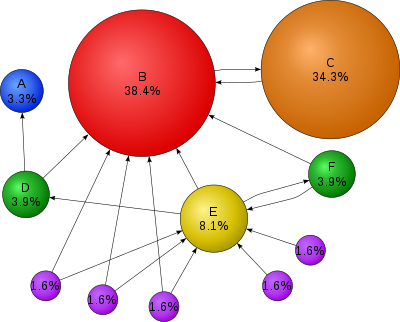If you want to get your web page noticed but don’t want to spend a lot of money on advertising, your best bet is search engine optimization, or SEO. As of this writing, that mostly means understanding how Google ranks search hits, and adapting your web presence accordingly.
Historically, search engine results were ranked based on the frequency and proximity of keywords in the page text. But as the web grows, there are tons and tons of pages out there with the same or similar keywords. Any Google search on any remotely mainstream topic is going to return thousands and thousands of hits, most of which are useless to you. Another problem is that the keyword system is easy to game. Unscrupulous web designers can load up a page with invisible keywords repeated over and over, by putting them in the same color as the background off to the side of the page.
To make its results more useful, Google tries to rank its keyword-based search results in the order of their relevance. They do this using a complex proprietary algorithm called PageRank, the real heart of their search engine. One of PageRank’s most heavily weighted factors is the number of links pointing to a page. If more people link to your site, presumably that’s because it’s more useful or authoritative. PageRank also recursively factors in the number of links going into those pages that link to you.
So the key to a higher Google rank is getting other pages to link to you. The question is, how do you get those precious inbound links?
The first step is to do a lot of linking to yourself. Using blogs, Twitter, Delicious, Flickr and other social networks, you can link to your own site with impunity. A single Twitter post is a full-fledged web page unto itself and any links within it count just as much toward your Google PageRank as any other.
Internal links from one page within your web site to another all count towards your PageRank total. This is why blogs are so great for SEO. They create tons of internal links automatically: tags, categories, previous/next post links, and so on. WordPress users can get even more SEO benefit from plugins like Random Posts, Calendar and Most Commented.
Another way to get your URL out there is to comment on other people’s blogs. Nearly all blog platforms give you a chance to add a link to yourself when you post a comment. This SEO strategy has given rise to the automated blog-commenting spambot, a program that generates a human-seeming comment from keywords in your site with a link back to some online vitamin seller or what have you.
In addition to links, you still need to make sure your keywords are in place in your page copy. What search terms are people likely to use when looking for your site? Put yourself in the shoes of a stranger out there on the internet. Do some Google searches in character as this stranger. Make sure the phrases that you’re searching with appear verbatim in your page text.
Freshness of content matters too. Google ranks newer material higher than older material. This is yet another reason why blogs are better than static web sites for getting yourself noticed. Twitter is even better for keeping your presence up-to-date.
Plain-English URLs and page titles help too. Notice that the addresses of the posts in this blog spell out what the post is about. If your page titles and URLs give some indication of what’s on the page, that helps both humans and the Google robots identify them properly.
SEO companies have all sorts of esoteric methods and tricks, technical stuff like alt tags and XML sitemaps. By all means, try these things, they can’t hurt and might marginally help. But fundamentally, SEO is all about having well-written content that’s genuinely useful or interesting to other people, and having lots of links pointing at your site. These more basic approaches take time and effort, but ultimately, they really work.


In my personal experience, the Google/Yahoo ratio is about 100/1. But I can’t speak to the internet at large.
What percentage of web traffic is generated by Yahoo versus Google?
Here’s another super useful link from Kurt, the Ultimate WordPress SEO checklist:
http://www.tjdzine.com/wordpress/the-ultimate-wordpress-seo-checklist/
Hi Kurt. I had forgotten to include this site. People, check it out, it’s the bomb.
Not sure if you know of this site, but seems like it might help.
http://www.seomoz.org/